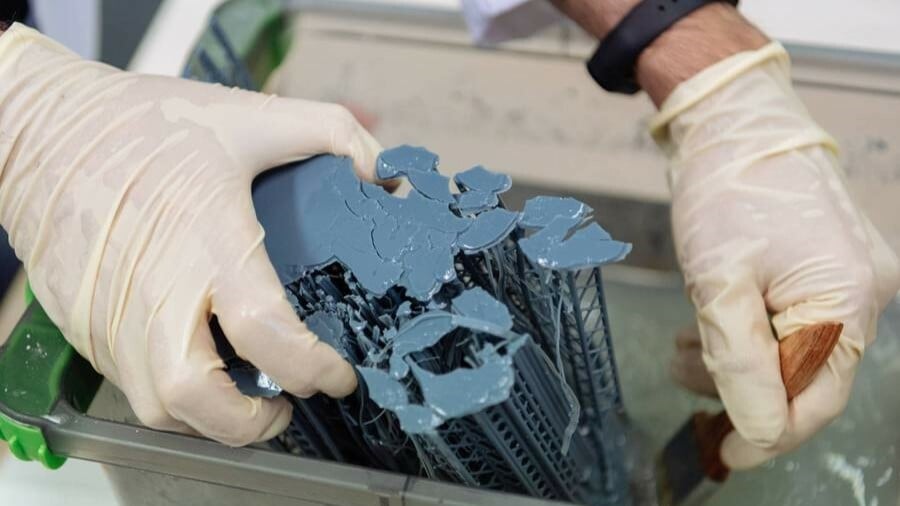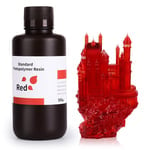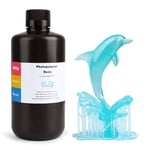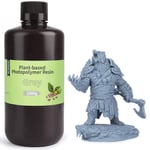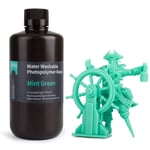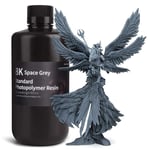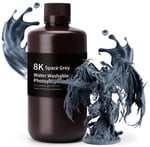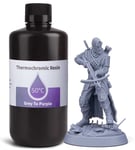The affordable Mars LCD was the first printer released by Elegoo, which contributed to making resin printing accessible to the masses. They have since expanded their ecosystem massively, incorporating their own lineup of FDM printers, large format resin printers, DLP printers, and resin. Their latest releases (at the time of writing) include the Saturn 3 Ultra Mono, a 12K LCD printer, and the Mars 4, their first DLP machine.
And with the machine offering growing, their material lineup had to expand too. Today, Elegoo has nine resins to choose from, all with specific properties and use cases. All of them cure at the same wavelength of UV light (around 405 nm) and are compatible with other brands’ printers, as long as they operate in that section of the spectrum.
Elegoo’s resins are designed to work best with Mars and Saturn printers, mostly thanks to a very extensive official exposure chart that tracks timings for all resin and printer combinations. We will dive deeper into this later in the article.
But first and foremost, let’s set the baseline for the terms and specs we will focus on, and then we’ll go over the different resins that Elegoo has to offer.
A Few Considerations
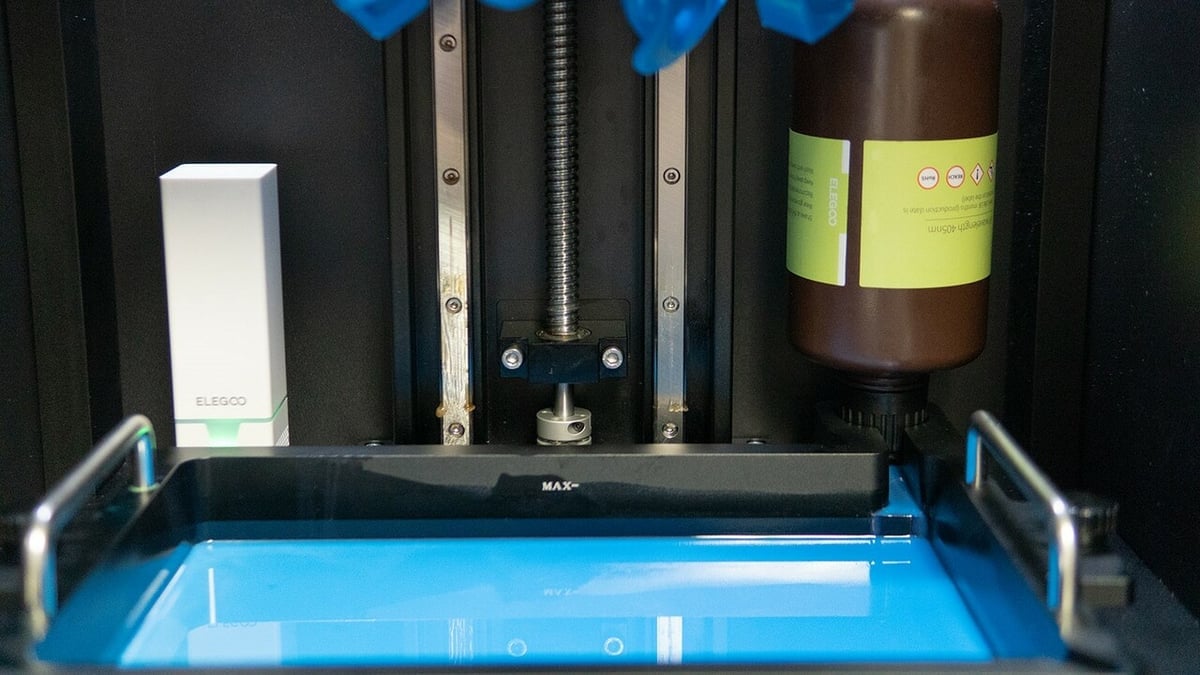
If you’re just getting started in the world of resin 3D printing or you’ve got to make a decision for a new project, it’s not as straightforward as looking at color availability or price. Choosing the right resin for the job can be tricky, especially if datasheets show only analytical data with no real-world comparison. These values are not without meaning, but contextualizing them is key to understanding how they affect printing.
When choosing resin, nothing is more important than the curing wavelength. In a nutshell: UV resin printers don’t all emit the same light. The most common spectrum section used is between 385-405 nm, but certain manufacturers prefer to use slightly higher or lower values. Wavelength is tied to the printer’s light source, and can’t be changed. Using a 405-nm resin in a 365-nm printer will result in uncured parts. All Elegoo resins are meant to operate in the range of 355-410 nm.
Compatibility is also crucial. Certain formulations are intended to be used specifically with DLP printers, while others work best on LCD ones. Elegoo claims that all their resins are compatible with both LCD and DLP printers, albeit we were unable to directly verify this claim. The consensus among the community seems to be that while standard resins do work well with DLP printers, DLP-specific resins help hide the voxels and bring up more detail.
Even if often overlooked, temperature is another key factor in achieving great results. UV resins are quite sensitive to ambient temperature, and won’t cure properly if it’s too cold. All the resins in this list are formulated to operate ideally between 20 and 25 °C. If the room’s temperature is below the threshold, consider preheating the resin and using an actively heated enclosure.
Viscosity is another aspect that deserves attention. Viscous resins are inherently harder to print as they exert higher forces on the FEP sheet when peeling away. They also affect the curing times and final quality of the part, with lower-viscosity resins being considered less prone to layer delamination and air pockets.
Density must be kept in mind when choosing resins for high-res printers, such as those with 8K or 12K screens. A lower-density resin will print faster and cost less, but it will also have less material to be cured, possibly resulting in a low-resolution print. Resin formulations come as is, without the need to be further diluted to lower the density.
Wash type is quite intuitive. Most types need to be washed after printing in IPA, while the conveniently named water-washable ones can be rinsed in water. In both of those cases, you can’t discard the remains in the sink. You need to comply with your local regulations on the disposal of hazardous waste.
Safety should always be the priority. Pay no attention to the marketing of the product boasting the low smell and non-irritant formulation: always wear protective equipment such as N95 or superior facemask, and a pair of nitrile gloves. If you spill resin on your skin, wash with water as soon as possible and keep an eye out for a rash forming. In the latter case, contact your doctor, as you might be particularly sensitive to resin irritation.
Finally, shelf life indicates how long does the resin last under ideal temperatures, humidity, and UV conditions. All Elegoo resins have a 2-year lifespan, which can be reduced if improperly stored or left to partially cure in the vat.
Layer Times
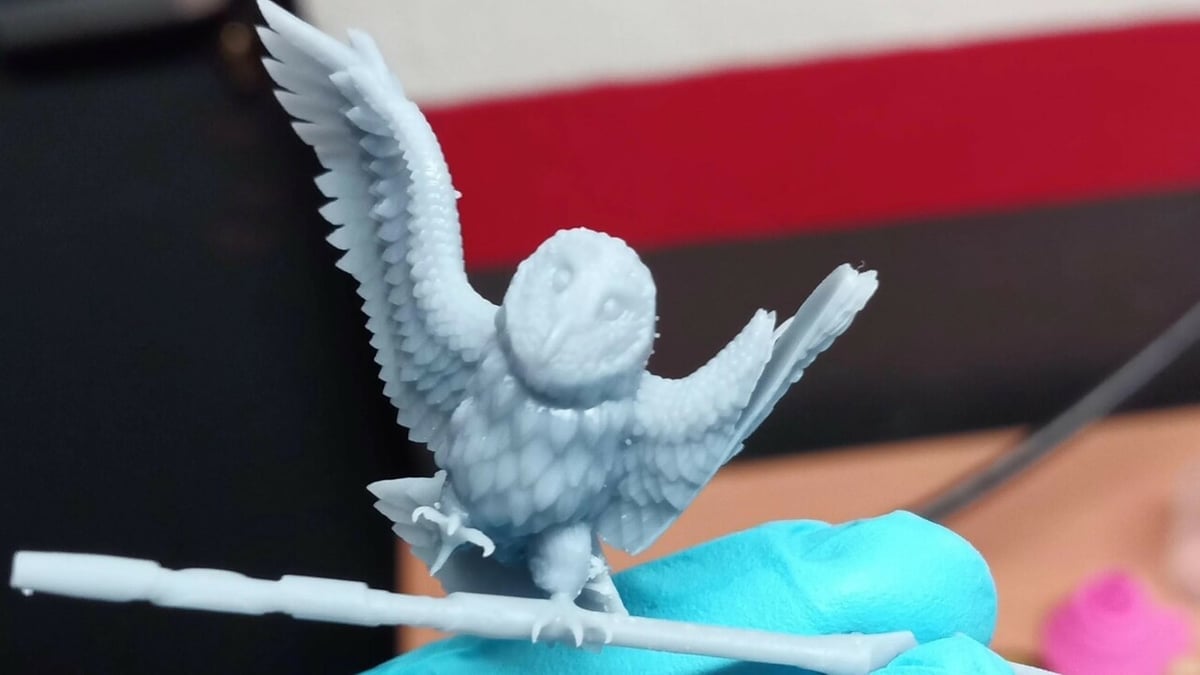
Elegoo has kept a record of all the exposure times across all their resins and printers. Simply scroll the sheet and find the combination that suits your hardware, and use the values as a baseline. They also include unofficial profiles contributed by users in the community. You can find all of it on the official support page.
Speaking of community profiles, many slicers have started to include them in the material selection. In Lychee, for example, you can see what the most popular settings are, and what success rate they see. This is incredibly helpful if you’re trying to nail the best times for a specific resin and printer combination that isn’t covered by official sources or forums.
Now that we’ve gone over what you need to know about resins, let’s take a look at what Elegoo currently offers. Note that some colors may be available through different resellers, and prices may vary.
Standard
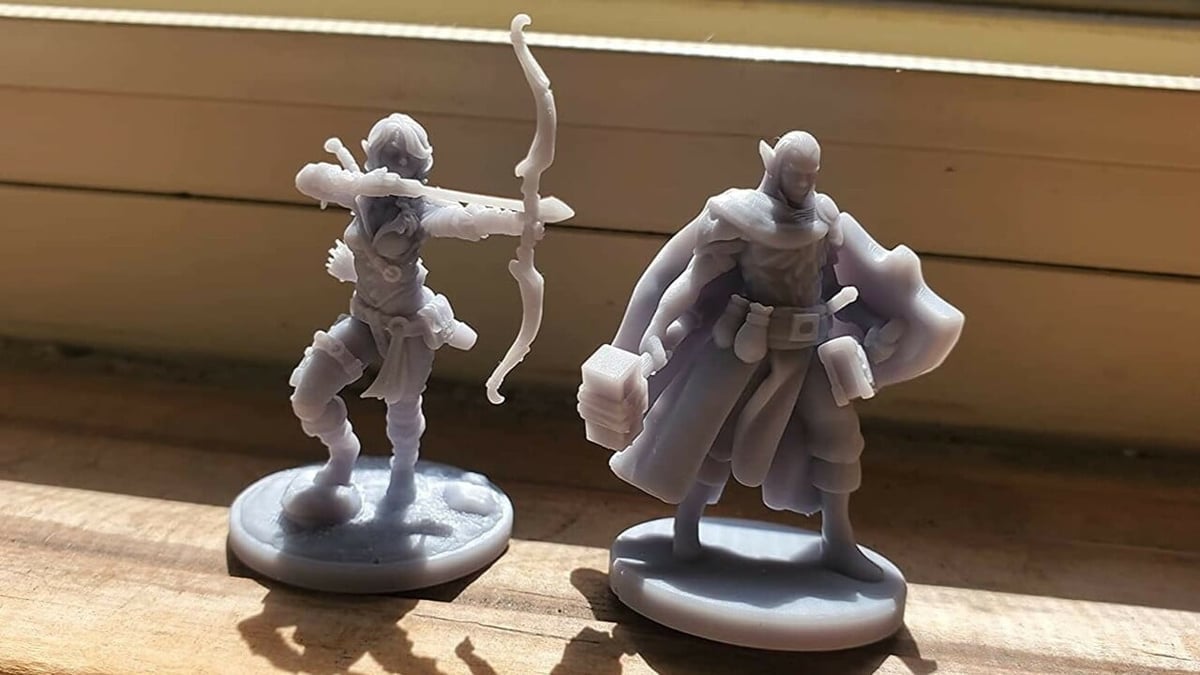
The Standard resin lineup is a budget option for those aiming at good all-around results. It’s ideal for those projects that don’t require any particular mechanical property, like miniatures, busts, or dioramas. It has the widest printer compatibility, being supported by all Elegoo machines.
In terms of specifications, it can withstand temperatures up to 80 °C when fully cured and has a Shore hardness between 85 and 88D. It’s not as strong as the ABS-like resin, but it’s also not as brittle as the water-washable option. While it has a relatively low volume shrinkage of 3.72-4.24% when cured, be sure to size your prints accordingly.
A new and improved V2.0 formula has recently been added to the lineup. There’s not much information available at the time of writing, but it seems like the difference is in the details, as a Reddit user shared that Elegoo’s support stated that “Standard Resin 2.0 has better scratch resistance, lower shrinkage, and higher printing accuracy”.
While some Amazon reviewers point out the pungent smell, the number of colors available and relatively low price make this a pretty good resin. Although, it’s worth noting that not all colors are available in both sizes.
- Viscosity: 200-350 mPa/s
- Density: 1.05-1.13 g/cm³
- Colors: Yellow, maroon, green, clear green, blue, clear red, beige, white, black, gray, translucent
- Sizes: 0.5 kg, 1 kg
- Price: ~$20 (0.5 kg); ~$30 (1 kg)
ABS-Like
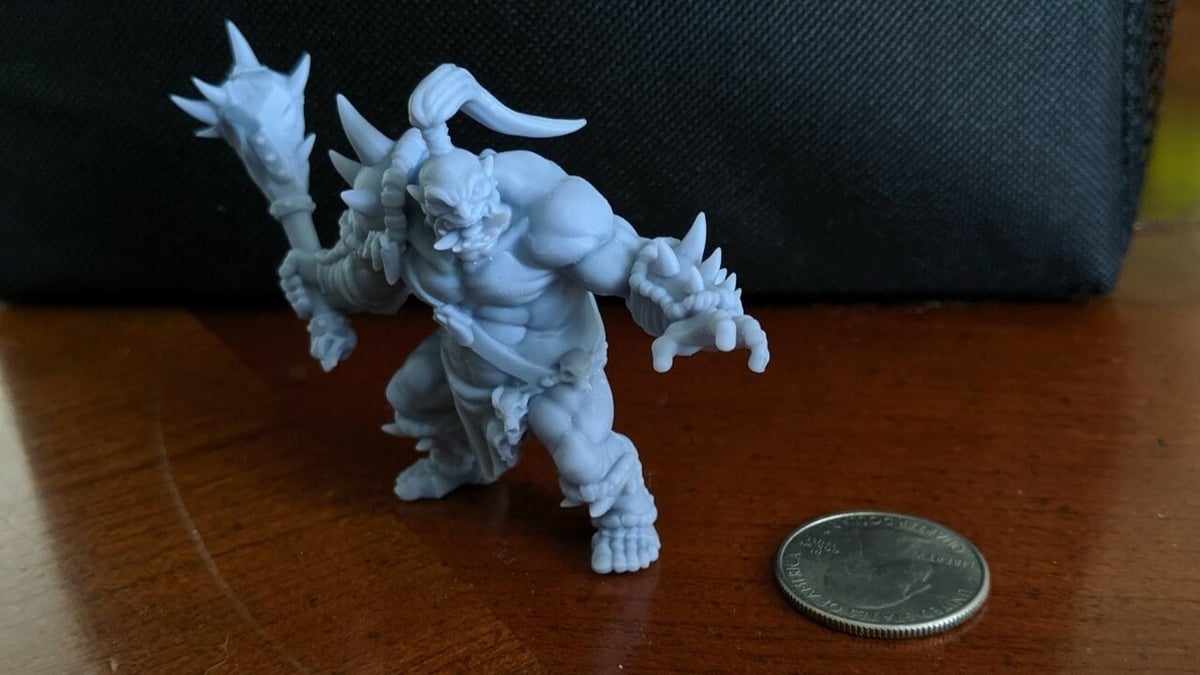
As the name suggests, this formulation aims at emulating the properties of ABS plastic, in liquid form. It’s the strongest material in Elegoo’s lineup, with a tensile strength of 39.39 MPa (megapascals) and a max load capacity of 167.1 kgF (kg of force). It can also sustain a 14% elongation before breaking and undergo 40.54 MPa of flexion before snapping. It’s perfect for more demanding applications, such as prototypes and functional parts. Although, this resin is more expensive than the standard, unlike ABS filament which is usually a budget material.
On the more practical side, ABS-like resin has some downsides. It’s not as hard as other entries, coming in at a Shore hardness of 84D, which makes it more prone to scratching and denting. It does have a 7.1% shrinkage rate when fully cured, which is quite high, and while some reviewers point out the significant smell, others suggest it’s not an issue.
A recent V2.0 version improves dimensional accuracy by reducing part shrinkage, but it also has marginally worse mechanical properties. If you’re interested in the specs, V2.0 has a reported max load of 151.9 kgF and a tensile strength of 35.8 MPa.
- Viscosity: 150-200 mPa/s
- Density: 1.10 g/cm³
- Colors: Clear blue, mint green, clear red, gray, translucent, white, smoky black
- Sizes: 0.5 kg, 1 kg
- Price: ~$20 (0.5 kg); ~$35 (1 kg)
Plant-Based
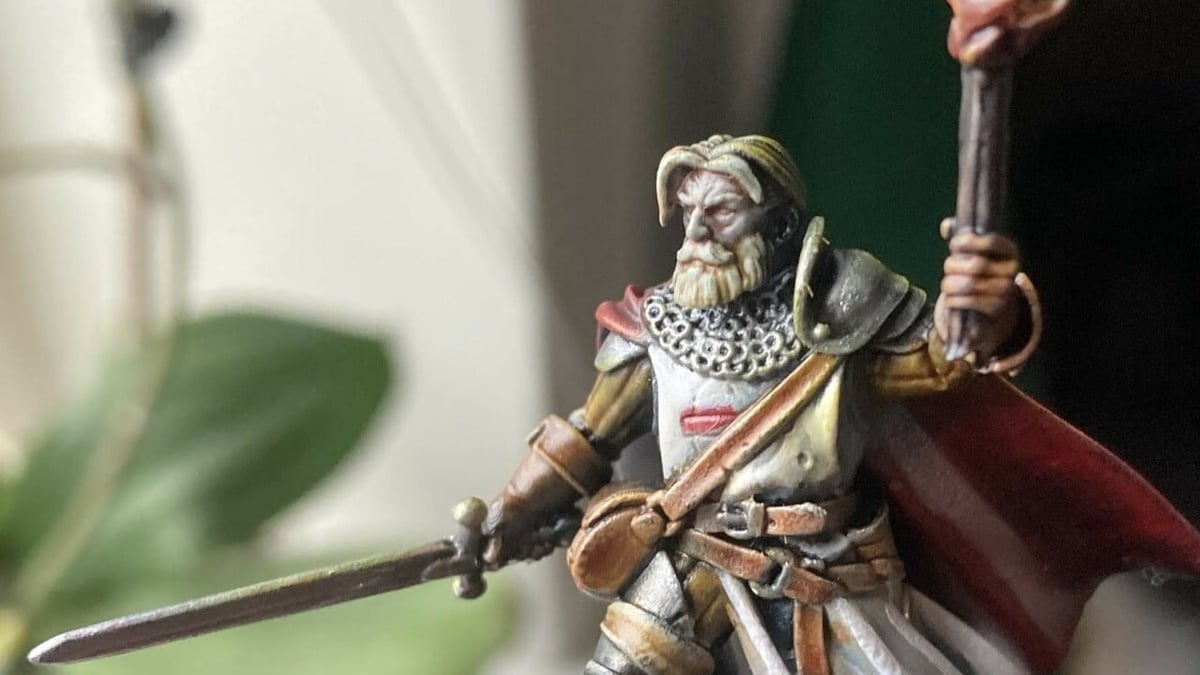
This soybean-derived blend aims at lowering the smell and irritation of classic resin formulations. Many are crediting Elegoo with actually diminishing the smell and potential irritants, but at least in terms of odor, reports confirm that albeit improved, it’s still producing a smell.
And even if marketed as non-irritant, you still have to wear protective equipment when handling it. As with all the other resins, it can’t be disposed of in the sink. The plant origin does not lower the toxicity for aquatic lifeforms.
According to the specs, this resin is much more resistant to elongation and flexural stress and has an overall lower impact and load resistance. In other words, it’s brittle. The higher viscosity helps to lower printing times significantly.
The use cases for this product are admittedly limited: it’s a material more geared toward the operator rather than the application. We can see it being used as an alternative to standard resin for decorative prints.
- Viscosity: 200-400 mPa/s
- Density: 1.05-1.25 g/cm³
- Colors: White, gray, translucent green
- Sizes: 0.5 kg, 1 kg, 2 kg
- Price: ~$15 (0.5 kg); ~$35 (1 kg); ~$70 (2 kg)
Water-Washable
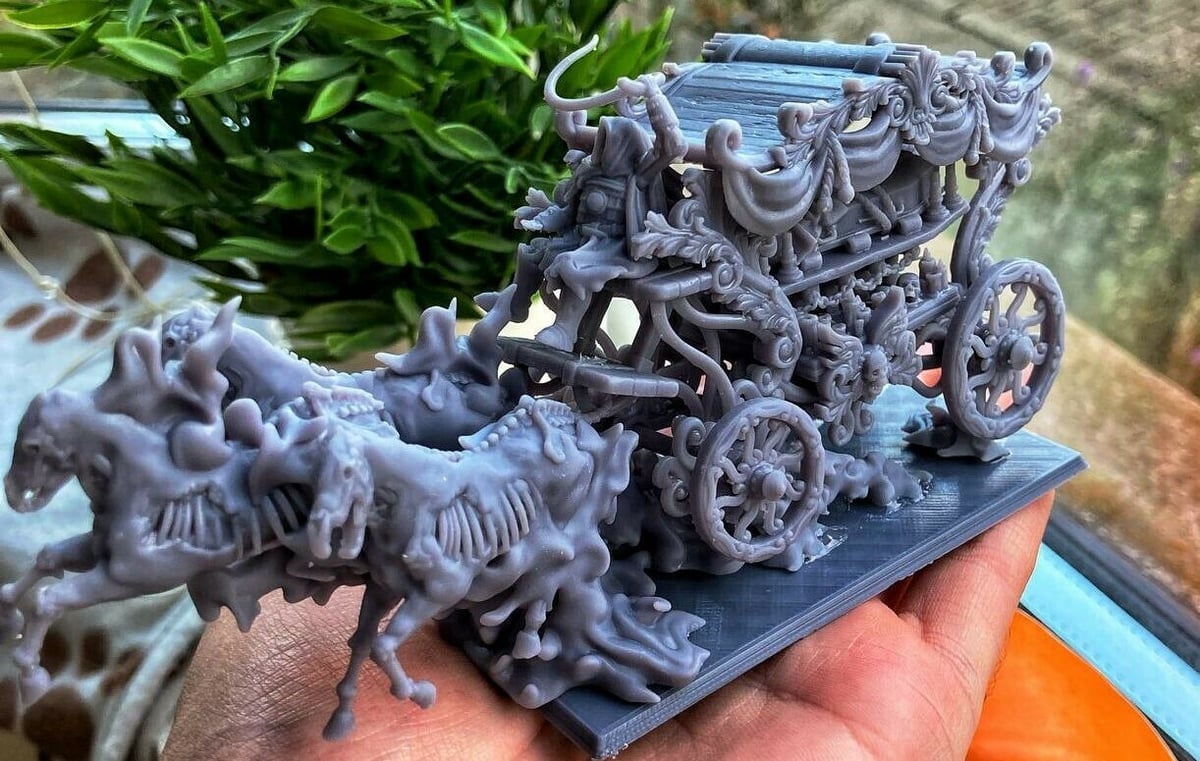
Water-washable resin caters to those who hate resin cleanup, who don’t have access to cheap IPA or cleaning products, or who simply want to avoid that path. This is particularly helpful for European makers (who can’t purchase isopropyl alcohol as easily). IPA is a big chunk of the consumable costs and does come with plenty of limitations, as it’s hard to dispose of when saturated and it’s flammable.
You can rinse this formula with tap water to achieve the same results. Of course, remember not to throw away the contaminated water afterward. It’s still hazardous waste.
Elegoo’s water-washable resin has a lower shrinkage rate, as well as a slightly higher-than-usual density, which makes it perfect for fast and accurate prints. It’s also the most neutral of the list in terms of odor.
But the benefits end up here. It’s significantly more brittle compared even to the standard resin, and can withstand only ~65% of the load forces when compared to ABS-like resin. It’s clear that its use cases should be limited to decorative prints and miniatures only, which is where having plenty of color options comes in handy, although they’re not all offered in all sizes. The relatively higher price tag can be offset by the savings on IPA.
- Viscosity: 100-350 mPa/s
- Density: 1.05-1.25 g/cm³
- Colors: Gray, white, black, clear blue, mint green, clear green, beige, yellow, clear red, smoky black
- Sizes: 0.5 kg, 1 kg, 2kg
- Price: ~$20 (0.5 kg); ~$35 (1 kg); ~$70 (2 kg)
8K
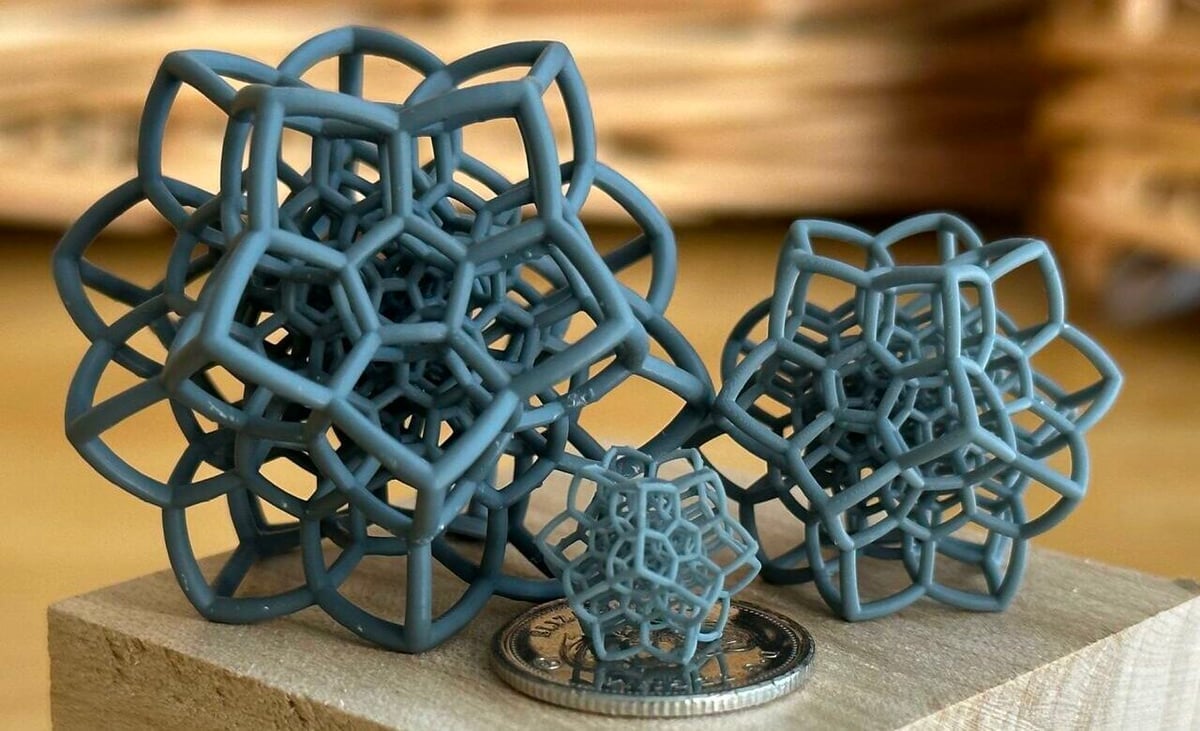
Elegoo’s 8K resin features an improved formulation purpose made for high-resolution printers. Much of the changes here have been made to the viscosity and fluidity, improving both. This allows the printer to better define the small details that would otherwise go lost in the mud.
It has very similar specs to the ABS-like resin, making it a great option for practical prints too. Interestingly, it’s even stronger than the standard resin for LCD. That said, the price is definitely on the higher side.
The reviews on Amazon are vastly positive, with users pointing out that, while trickier to work with than the Standard lineup, the results are excellent.
- Viscosity: Not specified
- Density: Not specified
- Color: Space gray
- Size: 1 kg
- Price: ~$40
Water-Washable
In addition to the standard 8K resin, Elegoo also offers a water-washable version, making it easier for those who don’t want to or can’t use IPA. Unfortunately, Elegoo hasn’t released the specifications on density and viscosity for their 8K products, so we don’t have data to compare. From what we could gather, this formulation behaves just like the normal water-washable resin when subject to mechanical stresses. The biggest difference, in this case, is the price tag.
- Viscosity: Not specified
- Density: Not specified
- Color: Space gray
- Size: 1 kg
- Price: ~$50
Thermochromic
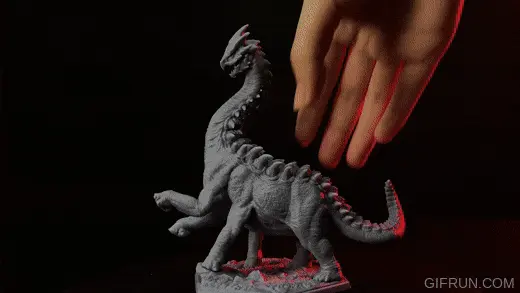
In a fun (or at least, interesting) twist to Elegoo’s catalog, this formulation mutates colors when subjected to a temperature change of around 50 °C. The only color variation available is gray-to-purple, which is surely an interesting combination. The resin reverts back to gray when the temperature is lowered.
The base resin formulation is the same as the ABS-like, so it shares the same mechanical strength and shrinkage rate.
This product is one of the most expensive on the list, priced at around $40/kg. At this price point, it’s definitely more of a novelty material to print gifts and gadgets out of, and it’ll be wasted on models that are meant to be painted or kept at an even temperature. But if you have the cash to spare and want to see what it can do, it’ll be a fun addition to any 3D printing setup.
- Viscosity: 150-200 mPa/s
- Density: 1.10 g/cm³
- Color: Gray-to-purple
- Size: 1 kg
- Price: ~$40
License: The text of "Elegoo Resin: The Best Options of 2023" by All3DP is licensed under a Creative Commons Attribution 4.0 International License.
CERTAIN CONTENT THAT APPEARS ON THIS SITE COMES FROM AMAZON. THIS CONTENT IS PROVIDED ‘AS IS’ AND IS SUBJECT TO CHANGE OR REMOVAL AT ANY TIME.

